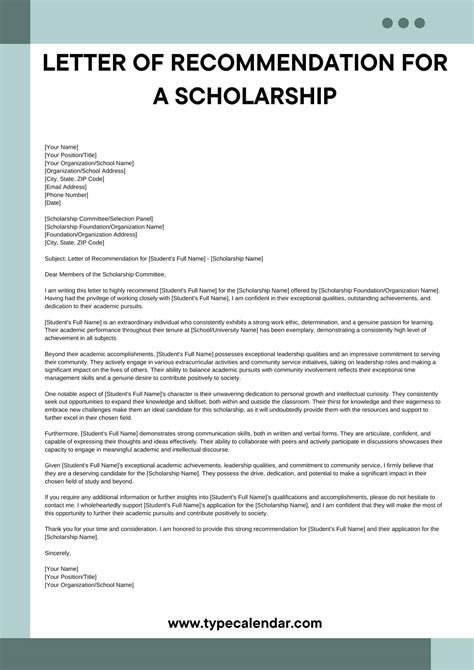A scholarship reference letter is a critical component of a scholarship application, providing a trusted third-party perspective that highlights your strengths and suitability for the scholarship. Crafting an effective reference letter requires careful consideration and thoughtful writing. This comprehensive guide will empower you to secure compelling reference letters that enhance your scholarship application.

Significance of a Reference Letter
- Credibility: Letters from respected individuals provide unbiased validation of your achievements, character, and potential.
- Objectivity: References offer an external perspective that complements your self-written application materials, reducing bias.
- Supporting Evidence: References provide specific examples and anecdotes that concretely illustrate your strengths and accomplishments.
Who to Choose as a Reference
Select individuals who:
- Know you well: Choose professors, employers, or mentors who have witnessed your academic or professional skills firsthand.
- Respect your work: Choose someone who is genuinely impressed with your abilities and believes in your potential.
- Can write well: Request references from individuals who are articulate, organized, and capable of writing clear and compelling letters.
How to Request a Reference Letter
- Approach directly: Politely ask your chosen references if they are willing to write a letter on your behalf. Explain why you value their opinion and how your scholarship application will benefit from their support.
- Provide materials: Provide your references with a copy of your resume, personal statement, and any relevant application materials. This will help them understand the context of your scholarship application and tailor their letter accordingly.
- Give a deadline: Establish a reasonable deadline for the letter to be completed. Allow ample time for your references to write thoughtfully while ensuring they meet application deadlines.
Tips for Writing an Effective Reference Letter
1. Start Strong:
- Begin with a clear statement of your relationship to the applicant and the context of your recommendation.
- State the applicant’s full name and the scholarship they are applying for.
2. Highlight Specific Strengths:
- Provide concrete examples that demonstrate the applicant’s academic, professional, or personal qualities that align with the scholarship criteria.
- Use specific language and anecdotes that illustrate their unique contributions and potential.
- Quantify achievements whenever possible, using numbers or metrics to convey their impact.
3. Address the Scholarship Criteria:
- Carefully review the scholarship criteria and tailor your letter to address the specific requirements.
- Explain how the applicant’s qualifications, experiences, and goals align with the objectives of the scholarship.
4. Use Strong Vocabulary:
- Employ professional and descriptive language to convey your high opinion of the applicant.
- Avoid generic or overused phrases. Instead, opt for impactful words that convey their strengths effectively.
5. Offer a Personal Touch:
- Share a personal anecdote or example that showcases the applicant’s character, work ethic, or unique qualities.
- Explain why you believe they are an exceptional candidate and deserve the scholarship.
6. Conclude with a Strong Recommendation:
- State your enthusiastic recommendation for the applicant without hesitation.
- Specify the type of scholarship you are recommending them for and express your confidence in their ability to succeed.
- Offer to provide additional information if requested.
Sample Reference Letter Outline
1. Opening Paragraph:
- Introduction and relationship to applicant
- Statement of intent and scholarship name
2. Paragraph 2:
- Specific examples of academic or professional achievements
- Relevance to scholarship criteria
- Supporting evidence and quantifiable metrics
3. Paragraph 3:
- Personal qualities, work ethic, and character
- Anecdote or example to illustrate their unique contributions
- Impact on others or the community
4. Paragraph 4:
- Address specific scholarship criteria and how the applicant meets them
- Explanation of their potential and why they deserve the scholarship
5. Closing Paragraph:
- Enthusiastic recommendation
- Statement of support for specific scholarship
- Offer to provide additional information
Conclusion
A strong reference letter for a scholarship application can significantly enhance your chances of success. By following the tips and guidelines outlined in this guide, you can effectively convey your strengths and secure compelling recommendations that will make your application stand out. Remember to approach your chosen references respectfully, provide them with the necessary materials, and express your appreciation for their support.
